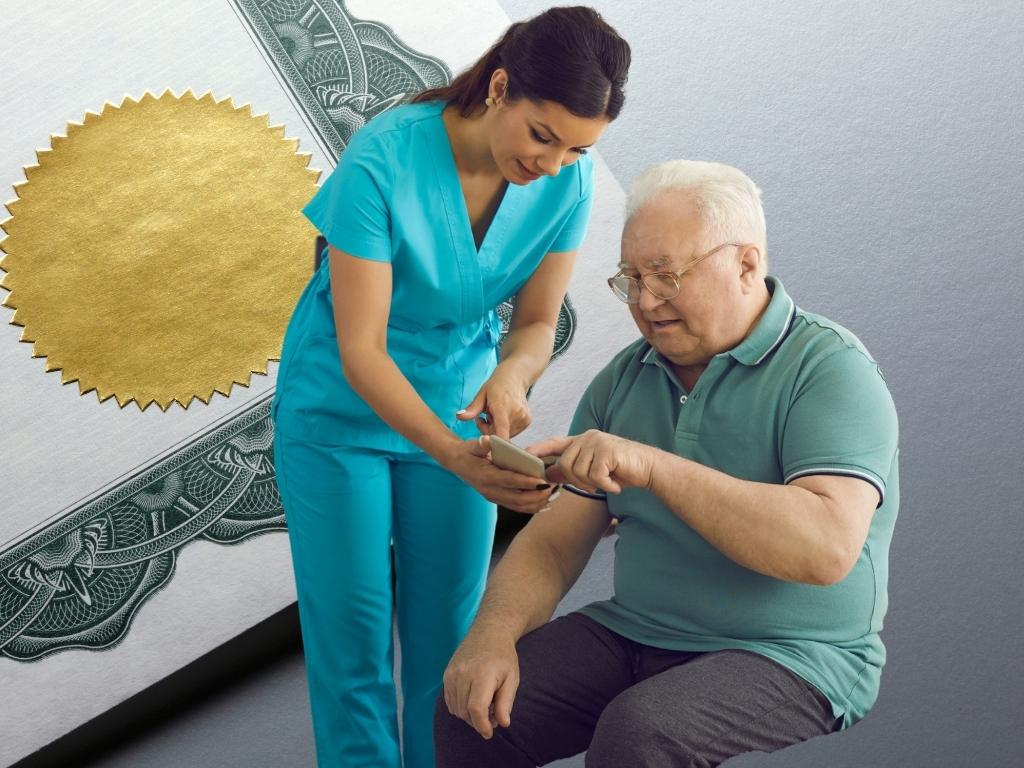
If you enjoy helping others and are wondering how to get a home health aide certificate, so you can do this job, then this article is going to be very useful for you.
What Is A Home Health Aide?
A home health aide, also known as an HHA, is a person who is responsible for providing the basic care that a person needs, in most cases, elderly.
This is a task that requires a high degree of empathy and dedication to service.
What Are The Tasks Of A Home Health Aide?
A home health aide provides care for her patient at her place of residence.
It is very important that the patient is in a clean and safe environment, so this person must be willing to perform the housework that is necessary for the well-being of their patient.
Home health aide responsibilities also include transporting and accompanying the patient to the doctor’s office or hospital.
In general, this person must be willing to take care of their patient in their daily activities, providing physical assistance, companionship and emotional support.
How To Get A Home Health Aide Certification?
In the case of the state of Florida, according to regulation of The Agency For Health Care Administration, a home health aide must provide personal care services assigned by and under the supervision of a registered nurse.
Therefore, to work as a home health aide, you must have documentation of successful completion of at least forty hours of training in the following subject areas, or successful completion of the competency test.
1. Communication skills;
2. Observing, reporting, and documenting the patient’s or client’s condition and the care or services provided;
3. Reading and recording of temperature, pulse and respiration;
4. Basic infection control procedures;
5. Basic elements of bodily functions that must be reported to the supervising registered nurse;
6. Maintenance of a clean and safe environment;
7. Acknowledgment of emergencies and applicable follow-up within the scope of performance of the home health aide;
8. Physical, emotional, and developmental characteristics of the populations served by the agency, including the need for respect for the patient or client, their privacy, and their property;
9. Appropriate and safe hygiene and grooming techniques, including bed baths, sponge baths, tub baths, or showers; shampoo, sink, bathtub or bed; nail and skin care; oral hygiene; denture care;
10. Safe transfer techniques, including use of appropriate equipment and ambulation;
11. Normal range of motion and positioning;
12. Nutrition and fluid intake;
13. Cultural differences in families;
14. Food preparation and housework;
15. Assistance with self-administered medications.
Assistance with self-administered medications
Home health aides who assist with self-administered medications must receive a minimum of 2 hours of training (which may be part of the 40-hour home health training) before assuming this responsibility.
This training must cover the requirements of state laws and regulations regarding assistance with self-administration of medications at home, procedures to assist the patient with self-administration of medications, common medications, recognition of side effects and adverse reactions and procedures to follow when patients appear to be experiencing side effects and adverse reactions.
Training must include verification that the home health aide can read the prescription label and instructions. People who cannot read should not be allowed to help with prescription medications. Other courses taken in fulfillment of this requirement must be documented and maintained in the home health aide’s personnel file.
Working in agencies with Medicare And Medicaid Services
If you want to work as a home health aide in agencies with Medicare and Medicaid services, the training must be at least 75 hours, with a minimum of 16 hours dedicated to supervised practical training. Similarly, the person being trained must complete at least 16 hours of training before starting supervised practical training.
In addition, it is very important to note that if a home health aide successfully completes training through a Florida Department of Education-approved vocational school, the individual must present to a home health agency, a diploma issued by the vocational school. If the home health aide completes training through one home health agency and wishes to work at another agency, the individual must provide documentation of successful completion of training to the second home health agency.
As you can see, to obtain the home health aide certificate, it is necessary to complete numerous requirements in accordance with current regulations, which guarantee the safety of patients.
Working as a certified HHA is exciting, and if you have the home caregiver vocation and the desire to help, go ahead and move on.